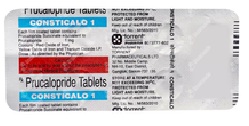pruease
Introduction to Pruease
Pruease is a medication primarily used to treat chronic constipation in adults. It is especially beneficial for those who have not found relief with other treatments. By enhancing bowel movements, Pruease helps alleviate symptoms such as abdominal discomfort, bloating, and infrequent stools.
Composition of Pruease
Pruease contains the active ingredient Prucalopride, which works by stimulating serotonin receptors in the gut. This action promotes bowel movement and increases the gut's motility, making stool passage more efficient.
Uses of Pruease
- Treats chronic constipation in adults.
- Increases bowel movements.
- Alleviates symptoms like abdominal discomfort and bloating.
- Improves the passage of stools.
Side Effects of Pruease
Common Side Effects:
- Headache
- Nausea
- Abdominal pain
- Diarrhea
- Flatulence
Serious Side Effects:
- Cardiovascular issues
- Severe gastrointestinal problems
- Psychiatric symptoms like mood changes, anxiety, or depression
Precautions of Pruease
Pruease should be used cautiously in patients with cardiovascular disease or mood disorders. It is not recommended for individuals with intestinal perforation, bowel obstruction, or severe inflammatory bowel diseases. The medication may cause an increase in heart rate and worsen psychiatric conditions. Always consult a healthcare provider before using Pruease.
How to Take Pruease
- Take Pruease orally, once daily.
- Can be taken with or without food.
- Available in two strengths: 1 mg and 2 mg.
- Take the medication at the same time each day.
- It usually starts working within 24 to 48 hours.
- Full effects may take 1 to 2 weeks to show.
Conclusion of Pruease
Pruease is an effective treatment for chronic constipation, especially for those who have not responded to other treatments. By enhancing bowel movements and alleviating discomfort, it significantly improves the quality of life for many patients. However, it is essential to use it under medical supervision, considering the potential side effects and precautions.

Similar Medicines
More medicines by Sun Pharmaceutical Industries Ltd
Available in 2 variations

strip of 10 tablets

strip of 10 tablets
Disclaimer : This information is not a substitute for medical advice. Consult your healthcare provider before making any changes to your treatment . Do not ignore or delay professional medical advice based on anything you have seen or read on Medwiki.
pruease
Prescription Required
Manufacturer :
Sun Pharmaceutical Industries LtdComposition :
prucalopride


















.svg)
